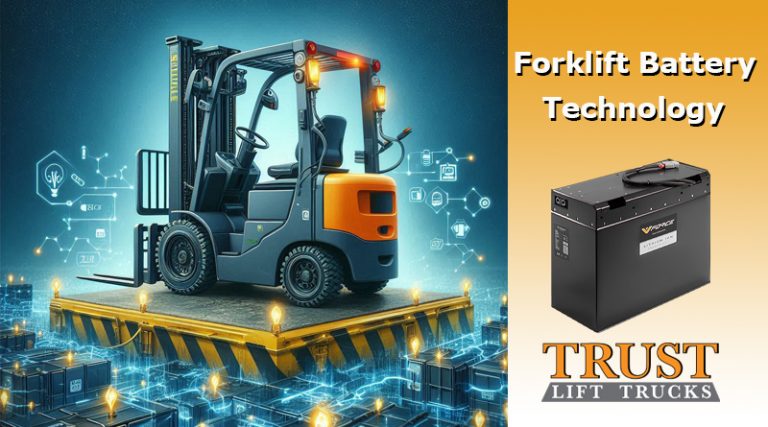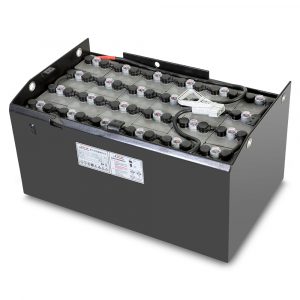Forklift Battery Technology: Recharging the Future

Electric forklifts have become increasingly popular in recent years due to their environmental benefits and improved performance. A key component of electric forklifts and reach trucks is the battery, which provides the power for operation. Understanding the different types of batteries used in electric forklifts can help you make an informed decision when selecting the right battery for your specific needs.
1- Lead-Acid Batteries: The Traditional Choice
Lead-acid batteries have been the most widely used type of battery in electric forklifts for many years. They are relatively affordable, widely available, and have a well-established technology. Lead-acid batteries are typically composed of lead plates immersed in an electrolyte solution of sulfuric acid and water.
Pros:
- Cost-effective: Lead-acid batteries are generally less expensive than other forklift battery types.
- Widely available: They are readily available from many suppliers.
- Established technology: Lead-acid batteries have a long history of use in electric vehicles and are well-understood.
Cons:
- Maintenance: They require regular maintenance, including water replenishment and equalization charging.
- Weight and size: Lead-acid batteries can be heavy and bulky, which can limit their use in some applications.
- Limited cycle life: Compared to newer battery technologies, lead-acid batteries have a shorter lifespan.

2- Nickel-Cadmium (Ni-Cd) Batteries: A Less Common Option
Ni-Cd batteries were once a popular choice for electric forklifts but have become less common due to environmental concerns related to cadmium. They are composed of nickel and cadmium electrodes immersed in a potassium hydroxide electrolyte.
Pros:
- Long cycle life: Ni-Cd batteries have a relatively long lifespan.
- Good performance in cold temperatures: They perform well in cold environments.
Cons:
- Memory effect: Ni-Cd batteries can exhibit a memory effect, where they may lose capacity if they are not fully discharged before recharging.
- Environmental concerns: Cadmium is a toxic metal, and the use of Ni-Cd batteries is being phased out in many regions.
3- Nickel-metal hydride (NiMH) Batteries:
NiMH batteries are another viable option, particularly for applications that require frequent deep discharges. They are environmentally friendly and have a longer lifespan than lead-acid batteries. NiMH batteries are also known for their ability to withstand repeated charging and discharging cycles without significant capacity loss.
4- Lithium-Ion Batteries:
Lithium-ion batteries are a game-changer for electric forklifts due to their modern technology and impressive performance. Here’s what sets them apart:
Pros:
Fast Charging: Reduces downtime with quick and opportunity charging.
Long Lifespan: Lasts 2-3 times longer than lead-acid batteries, often exceeding 10 years.
Low Maintenance: No watering, cleaning, or equalizing required, lowering upkeep costs.
Energy Efficiency: High energy density and consistent power output throughout discharge.
Safety Features: Built-in mechanisms for preventing overheating and overcharging.
Eco-Friendliness: Produces no harmful emissions and is recyclable.
Cons:
Higher Initial Cost: More expensive upfront compared to lead-acid batteries.
Compatibility: May require specialized chargers or adjustments to existing equipment.
Heat Sensitivity: Performs less efficiently in very high-temperature environments.

5- Fuel cells:
While still in the early stages of commercialization, fuel cells offer the potential for zero-emission forklifts. They generate electricity through a chemical reaction involving hydrogen and oxygen. Fuel cells are a promising technology for reducing emissions and improving air quality in indoor environments.
The Benefits of Advanced Battery Technology
The adoption of advanced battery technologies can bring numerous benefits to forklift operators and businesses, including:
- Increased productivity: Faster charging times and longer battery life allow for more efficient operations and reduced downtime. For example, lithium-ion batteries can charge up to 80% capacity in just 2 hours, significantly reducing the time spent waiting for batteries to recharge.
- Improved performance: Lighter weight batteries can enhance forklift maneuverability and load capacity. This is particularly important in tight spaces and applications that require frequent maneuvering.
- Environmental sustainability: Many newer battery technologies are more environmentally friendly than lead-acid batteries, reducing emissions and waste. For example, lithium-ion batteries and NiMH batteries do not contain toxic materials like lead, making them safer for both workers and the environment.
- Cost savings: While upfront costs may be higher, the long-term benefits of advanced batteries can lead to significant cost savings. Over time, the reduced maintenance costs, increased productivity, and extended lifespan of advanced batteries can offset the initial investment.
The Future of Forklift Battery Technology
As battery technology continues to evolve, we can expect to see even more innovative solutions that will further enhance the efficiency and sustainability of forklifts. For example, researchers are exploring the use of solid-state batteries, which offer the potential for even higher energy density, faster charging times, and improved safety. Additionally, advances in battery management systems are helping to optimize the performance and lifespan of forklift batteries.
By embracing these advancements, businesses can improve their operations, reduce their environmental impact, and stay ahead of the curve in a competitive market. The future of forklift battery technology is bright, and the benefits to both businesses and the environment are significant. Our Specialized technicians in Trust Lift Trucks would be happy to advise you on selecting the right forklift battery.
